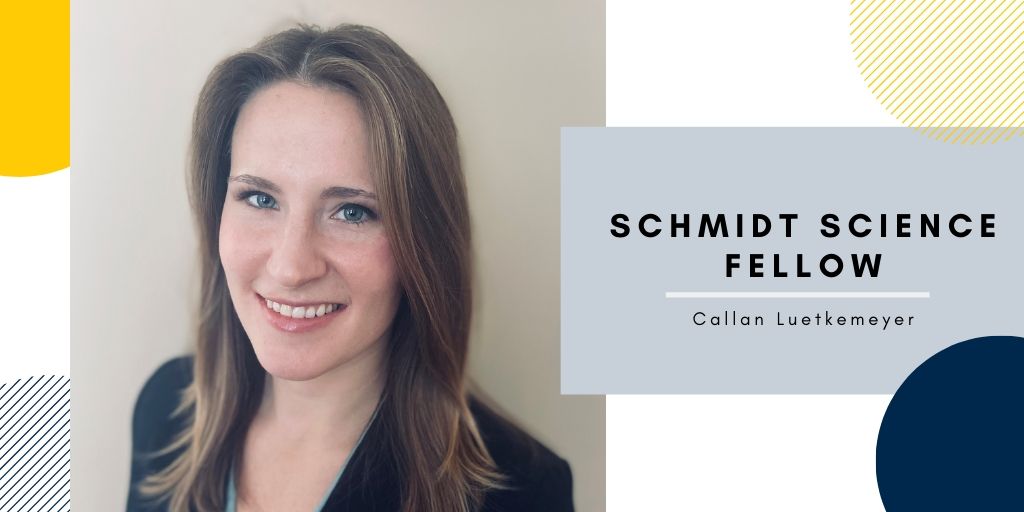
U-M ME Post Doc Callan Luetkemeyer has been named a Schmidt Science Fellow. A program of Schmidt Futures which was founded by Wendy and Eric Schmidt in partnership with the Rhodes Trust, Schmidt Science Fellows aims to develop the next generation of science leaders to transcend disciplines, advance discovery, and solve the world’s most pressing problems.
“As the need for rapid and innovative scientific discovery and response grows more urgent during this global pandemic, we are convinced now, more than ever, there is tremendous value in recruiting the most promising scientific minds to apply their intellectual rigor and investigation to additional disciplines,” said Wendy Schmidt “These exceptional early-career scientists join a growing community of Schmidt Science Fellows working to make transformative contributions, including new ways to fight against pandemic pathogens. Eric and I are excited to see what they can accomplish together.”
Each Fellow receives a $100,000 stipend and is paired with an internationally accomplished and experienced senior scientist as a mentor. Schmidt Science Fellows attend Global Meetings as a group during their fellowship year at the international science and innovation clusters. These convenings enable fellows to engage with new concepts, to visit leading science facilities, and to engage with renowned thought-leaders from science, business, policy, and society.
Luetkemeyer is a mechanical engineer and used her Ph.D. to develop new models of the anterior cruciate ligament, aiming to improve injury prevention strategies that are currently based on overly simple existing models. As a Schmidt Science Fellow, she will pivot into biology to work on the extracellular matrix in our tissues. When this is damaged in soft orthopedic tissues it can lead to chronic pain, but the point at which stress to the matrix leads to damage is not well understood. Luetkemeyer hopes that her work could lead to ways to detect microdamage in tissues well before a significant injury.
“The Schmidt Science Fellowship provides me with a rare and tremendous opportunity to pursue my own interdisciplinary research vision with help and guidance from a leading scientist from a different field,” said Luetkemeyer. “I’m interested in understanding soft orthopedic tissue injuries, like ACL tears and intervertebral disc injuries. As a mechanical engineer, I was primarily trained in solid mechanics, and my Ph.D. thesis focused on characterizing the relationship between mechanical stress and deformation in the ACL. I made significant progress in this area, demonstrating that mechanical deformation is not spatially homogeneous and developing methods to account for this. Still, the models I built are not able to predict the onset of microdamage, the precursor to injury. My plan as a Schmidt Science Fellow is to pivot into structural biology to learn techniques for detecting microdamage in the extracellular matrix – the macromolecules that give tissues their mechanical integrity. Combining these methods with my experience in deformation imaging will help me identify the thresholds for mechanical deformations that lead to microdamage in the extracellular matrix. Identifying these mechanical “injury criteria” will allow researchers to computationally investigate the risk factors for orthopedic tissue injuries, as well as serve as the foundation for a larger set of research plans I hope to one day tackle as a research professor.”
Luetkemeyer is one of 22 early-career scientists who make up the third cohort of Schmidt Science Fellows. The selection process for the 2020 Schmidt Science Fellows began with almost 400 nominated candidates from more than 80 world-leading science and engineering institutions.
Fellows were selected following a rigorous, multi-stage application and interview process that culminated in final-stage video interviews the program held due to the COVID-19 pandemic. In lieu of the in-person interviews of previous years, selectors and candidates joined from across eight time zones around the world.
“Training the next generation of interdisciplinary scientist-leaders and helping them achieve their potential for the world has never felt more important than it does today,” said Dr. Megan Wheeler, Schmidt Science Fellows Executive Director.” We are incredibly grateful to our selectors and candidates for working with us in recent weeks to deliver a robust, online process to select this high-caliber cohort of Schmidt Science Fellows from around the globe.”
Entering its third year, the growing community of Schmidt Science Fellows now numbers more than 50 emerging interdisciplinary science leaders. Members of previous cohorts are now pursuing roles in universities, start-up companies, not-for-profits, and national research institutes and are part of a lifelong Fellowship community.
Schmidt Science Fellows are supported to pursue a postdoctoral research placement at a world-leading laboratory anywhere in the world. This placement must be in research at a significantly different discipline from the Fellow’s PhD, with the aim of exposing them to ideas and skills that will help them examine scientific problems and approaches from different perspectives and to accelerate discoveries.